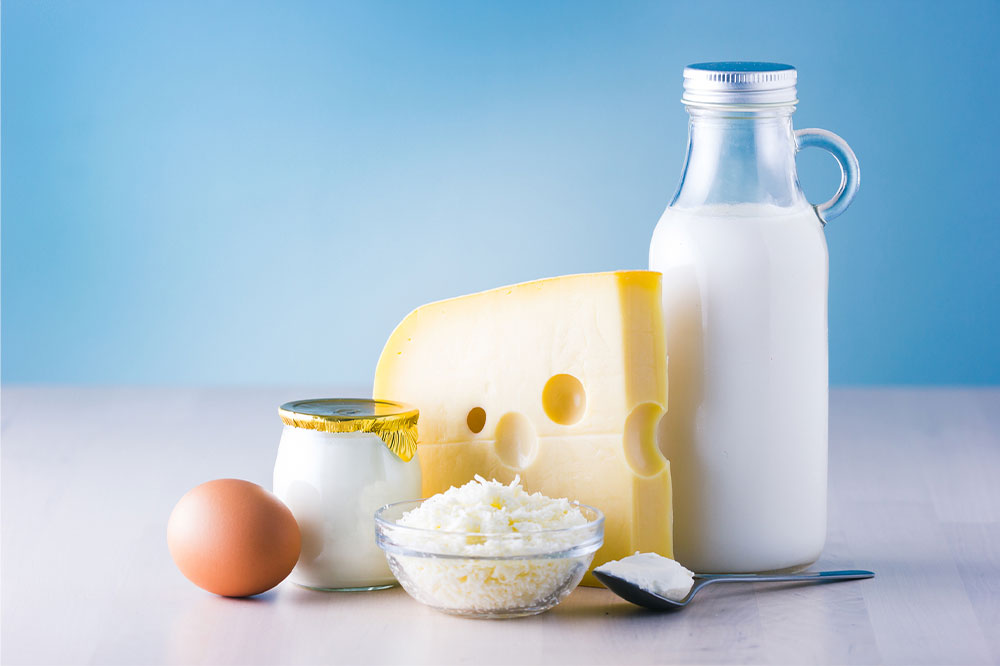Everything to know about dairy products and eggs
Dairy and eggs are essential parts of a complete meal as they provide nourishment to the body and help maintain one’s overall well-being. Both foods are similar in being animal products that are high in protein. These foods can also help ward off and fight illnesses. Further, these are basic ingredients for recipes and are extremely versatile as dairy products come in several forms, and eggs can be cooked in various styles.
Many believe that because of the similarities and the products often being grouped together, eggs are dairy products.
Dairy products categorization
Dairy is anything that contains or is made from milk. Milk-based products are categorized into four classes to set up appropriate pricing. Class I covers milk used for beverage, fluid, or milk products. Class II consists of milk that is used to manufacture “soft” products like sour cream, ice cream, yogurt, and cottage cheese. Class III is milk utilized to create hard cheeses. And Class IV covers products like butter and other dry options such as non-fat dry milk (NFDM). Whey protein and lactose-free milk options are also categorized as dairy products.
Nutritional value of dairy and eggs
Dairy and eggs make for some of the most nutritious food items, alongside vegetables, whole grains, nuts, seeds, and meats. A large egg contains 78 calories and essential nutrients like fat (5 g), carbs (1 g), selenium (28% of the daily value), riboflavin (20% of the DV), and vitamin B12 (23% of the DV), and proteins (6 g). Choline is another healthy nutrient found in eggs, along with tiny amounts of other minerals and nutrients. Dairy products also contain healthy properties and provide about 52% calcium, 17% protein, and 51% vitamin D consumed by people in the country. Vitamins B12 and A, riboflavin, pantothenic acid, niacin, zinc, and selenium are other nutrients found in milk-based products. Certain substitutes can also be one or more of these nutrients for those who are vegan.
Health benefits
When it comes to the benefits of adding eggs to meals, they can make one feel full, helping people avoid overeating and stay in shape. Having about three or more eggs can also increase healthy cholesterol levels (HDL), making it a heart-healthy food. Other benefits of eating eggs include lowering triglycerides, reduced risk of diseases like cataracts and age-related macular degeneration, and improved brain function.
Dairy products can work wonders for bone health and also help improve skeletal structure. People who consume low-fat or fat-free dairy products may benefit from a reduced risk of chronic diseases like type 2 diabetes and cardiovascular diseases. The potassium in dairy products helps lower blood pressure. Full-fat options may not be as healthy as low-fat dairy, but these can be occasional delicious treats that are also filling. Milk-based foods can also help control and ward off inflammation in the body.
How to get the most out of eggs?
Edible eggs can come from two primary sources, birds and fish. A few popular types of eggs in the country are caviar and those that come from chicken, quail, duck, turkey, and ostrich. You can have eggs in various forms like scrambled, fried, poached, and even shirred eggs. Other popular preparation methods include soft-boiled eggs and hard-boiled eggs. However, to reap the maximum benefits of eggs, it is important to get the best eggs and cook them in the right way. Here are a few tips to follow:
Pick a low-calorie cooking method and opt for boiled or poached eggs, as these methods can limit calorie consumption by not adding fats to the food.
Eat them with vegetables to add vitamins and fibers to the meal.
If you are going to fry the eggs, try oils that remain stable at high temperatures. These oils also do not oxidize easily to form harmful free radicals. Examples of such oils include sunflower oil and avocado oil.
Try to look for eggs that have the most nutritious value. For instance, pasture-raised eggs and organic eggs may be more nutritious than conventionally-produced eggs.
Avoid overcooking the eggs as they might lose their nutrients in the process.



